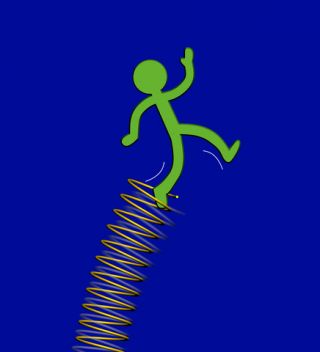Resilience
Why Some People Are More Resilient Than Others
A recent study discovered two factors that characterize resilient people.
Posted March 11, 2015 Reviewed by Jessica Schrader

According to the National Opinion Research Center at the University of Chicago, 92 percent of Americans report suffering at least one significant negative life event in their lifetime. We may lose our job, get divorced, or end up in the hospital from injury or illness. To put it mildly, life can be tough.
Although nearly everyone suffers negative life events, people respond to them differently. Some seem to grow stronger, shaking off what life dealt them and moving on. Others develop psychological disorders including, posttraumatic stress disorder (PTSD), general anxiety disorder, major depressive disorder, and substance abuse or dependence.
A recent study led by Heather Rusch of the National Institutes of Health’s National Institute of Nursing Research revealed two critically important factors that are associated with resilience in the face of adversity. And it turns out that both are under a person's control.
The researchers focused one of the most severe traumas people can experience: physical assault. A total of 159 women who had endured “assaultive trauma” were given a series of established questionnaires designed to gauge their current and past levels of PTSD and other psychiatric conditions, as well as various measures of resilience, social support, personality, and quality of life.
The good news is that the vast majority of respondents (79 percent) did not develop chronic PTSD following assault exposure. The most common negative psychological outcome was depression, which afflicted 30 percent of the respondents. The researchers then divided the respondents into three categories: those who had never been diagnosed with a psychiatric disorder; those who had been diagnosed with a psychiatric disorder in the past but had recovered; and those who were currently diagnosed with a psychiatric disorder.
Analysis of the questionnaire data revealed two crucially important factors that separated those who currently suffered a disorder from those who either never developed a disorder or had recovered from one: mastery, and social support.
Mastery refers to the degree to which individuals perceive themselves as having control and influence over life circumstances. This is not the same as optimism, which is the expectation of favorable outcomes that are not directly attributable to personal factors. Mastery, not optimism, is the better predictor of resilience in the face of trauma.
Previous studies have found that mastery attenuates PTSD symptoms in veterans and lessens depression in women who have suffered intimate partner violence. Higher mastery is also related to greater quality of life, as well as reduced cardiovascular disease mortality. In a related study involving nearly 4,000 adults, higher perceived mastery predicted better health, greater life satisfaction, and fewer depressive symptoms—regardless of socioeconomic class.
In an email to New York Magazine, writer Jesse Singal, lead researcher Rusch stated,
"I think a sense of personal control over one's life is central to psychological adjustment, especially in the aftermath of an assault, which can consume the survivor with feelings of uncertainty and powerlessness."
The second factor, social support, was also crucially important. But the emphasis is on "support." Respondents who reported strong supportive social ties were less likely to develop psychiatric disorders and more likely to recover from them if they did. In contrast, unsupportive, unreceptive, and critical responses from friends, family, or coworkers actually increased the risk to PTSD survivors. The researchers believe the negative impact likely arises from attempts to discourage open communication, which increases cognitive avoidance and suppression of trauma-related memories, social withdrawal, and self-blame. (For more about making friends, see my previous post.)
We don't always have control over the quality of our social networks, but we can increase our resilience by developing a stronger sense of mastery over our lives. The researchers helpfully discuss two means for achieving this goal:
Cognitive-behavioral therapy promotes greater mastery by helping patients regulate distressing thoughts and emotions. Ruminating on traumatic events can have a negative impact on emotional and physical health. Learning to move through negative thoughts and memories rather than getting stuck in them is crucial to psychological and physical well-being.
Mindfulness training also strengthens mastery by helping people to immerse themselves in the peace that can be found in the present moment. Mindfulness training has been shown to improve PTSD, depression, alcohol addiction, and physical health issues following trauma exposure.
On a personal note, I have also found that simply spending time on something that you do well can improve a sense of perceived control over one's life. Simple examples are gardening, playing a musical instrument, or even spending a little time playing video games that allow the user to advance through levels of expertise—anything that makes you come away with the feeling of "I can do this" teaches your mind and body what it feels like to succeed. Make sure you feel that today.
Copyright Denise Cummins March 11, 2015.
I am a research psychologist, a fellow of the Association for Psychological Science, and the author of Good Thinking: Seven Powerful Ideas That Influence the Way We Think; find more information at my website.




